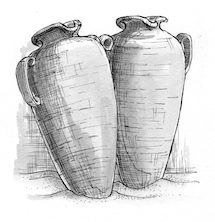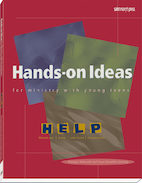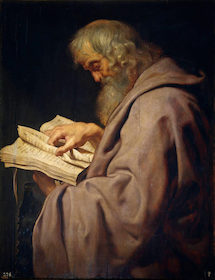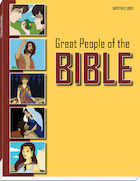Weekly Winner
Congratulations to Rafael Estrada, our winner for October 20th!
Rafael will receive the student book and the catechist guide from the Great People of the Bible parish curriculum, a $28.90 value!
Bring Salvation History to Life! Parish leaders have been requesting a Catholic Bible study curriculum for middle school students, created specifically to fit their parish schedules. Saint Mary’s Press is pleased to respond to this need with the Great People of the Bible parish curriculum.
The Great People of the Bible curriculum offers:
- A student book that is in conformity with the Catechism of the Catholic Church as a supplemental curriculum resource, and the only Bible curriculum for middle school students with this approval
- Twenty-five one-hour sessions designed to fit a typical parish calendar
- A catechist guide that offers easy-to-follow session outlines for the volunteer catechist
- Flexible options for the catechist to complete student activities in class or use as family learning assignments in the home
- One student book that covers both the Old and New Testament and that supports the ABC’s of biblical literacy
- Engaging student activities, now with expanded background content, based on the ever-popular Student Activity Workbooks for Breakthrough! The Bible for Young Catholics
Great People of the Bible
ISBN: 978-0-88489-690-6, paper, 56 pages
Focus on Faith
Hovering over Chaos
by Joanna Dailey
If you have ever endured a home-improvement project of any size, then you know what chaos is like. Today my entire house is topsy-turvy because I am getting a new kitchen floor. Hurray! It has been a long time coming. But, because I am fortunate to have a big kitchen with a few free-standing cabinets, everything in the cabinets had to be moved elsewhere so the cabinets themselves could be moved—"elsewhere" being the living room, dining room, and center hall.
Hence the chaos.
 They say your outer surroundings reflect (or should reflect?) your interior reality. If that is so, there must be a whole lot of chaos goin’ on in my interior realm! But, there is an upside to all this upheaval. Not only do I get to see and sort what I rarely see and rarely sort, but I also get this added benefit: The Holy Spirit always hovers over chaos! Sometimes it is only when we see our environment—or ourselves—in pieces that we get a glimpse of what could be a brand new whole. (The Make It Happen in this newsletter offers an activity which may help teens to see the pieces of their lives as part of a yet-to-be-determined whole.)
They say your outer surroundings reflect (or should reflect?) your interior reality. If that is so, there must be a whole lot of chaos goin’ on in my interior realm! But, there is an upside to all this upheaval. Not only do I get to see and sort what I rarely see and rarely sort, but I also get this added benefit: The Holy Spirit always hovers over chaos! Sometimes it is only when we see our environment—or ourselves—in pieces that we get a glimpse of what could be a brand new whole. (The Make It Happen in this newsletter offers an activity which may help teens to see the pieces of their lives as part of a yet-to-be-determined whole.)
Putting in this kitchen floor requires tearing up three layers of previous floor installations—three layers of what people thought was a good idea at the time. While the crew is tearing up my outer environment, pulling up the many layers of previous good ideas, I can wonder: Is there some interior attitude of mine that seemed like a good idea at the time but now is only getting in the way of the new work of the Holy Spirit? There just might be.
And another thought about newness: Two months from today is December 20, five days before Christmas! Christmas is a feast of newness, as we recall that our mighty God came to us as a newborn child. In these next two months, we might, in the midst of either order or chaos, look at our lives. We might ask ourselves if there is something old—whether that be old things, old clothes, or old attitudes—to which we need to bid a gentle farewell, in order to welcome the persistent hovering of the Holy Spirit, in order to prepare for new birth within.
Blessings on your ministry!
Peace and joy,
Joanna
Make It Happen
Broken Pots: A Lesson in Piecing Together a History
 Overview
Overview
The young people will piece together a broken pot to simulate their faith story. Each piece represents a particular aspect of their history: family, parish, prayer, youth camp, and so forth. This is a good activity for sacramental preparation classes, retreats, or sessions on religious heritage and tradition.
Suggested Time
About 30 minutes.
Group Size
This strategy works best with groups of 20 or fewer.
Click here to download the entire activity, "Broken Pots: A Lesson in Piecing Together a History."
This activity is an excerpt from the book Hands-on Ideas for Ministry with Young Teens in the H.E.L.P. series. Find out more about the book by clicking here, or by clicking on the book below.

Break Open the Word
Thirtieth Sunday in Ordinary Time, The Commemoration of All the Faithful Departed (All Souls)
Thirtieth Sunday in Ordinary Time
October 26, 2014
Matthew 22:34-40
Opening Prayer
- Jesus, in giving us the greatest commandment, you reveal the very nature of your relationship with God the Father. Love is the dynamic in which you dwell together with the Father and the Holy Spirit. Help us to make that consuming love the nucleus of our lives. Amen.
Context Connection
In this Sunday's Gospel the religious elite continue to question Jesus in hope of tricking him into saying something that they can use against him. They are desperate to diminish his popularity. We learn that the Sadducees, while discussing resurrection with Jesus, fail in their efforts to trip him up. The Sadducees, who espoused only beliefs found in the Torah, did not believe in resurrection; they argued that the Law was silent on this subject. Resurrection was hotly debated in Jesus' time. The Pharisees, however, believed in resurrection.
Now the Pharisees ask Jesus this question, "Teacher, which commandment in the law is the greatest?" (22:36). This was not an unusual question. A great teacher (rabbi) was expected to give a short summary of the Torah. The Pharisees compiled a list of 613 commandments that they found in the Torah, and they wanted Jesus to identify which he considered to be the most important. Answers to such questions helped people to be more devout in their religious practice. Jesus' answer is very orthodox and traditional and helpful, "You shall love the Lord your God with all your heart, and with all your soul, and with all your mind!" (22:37). Here Jesus quotes Deuteronomy 6:5, the very words that Moses enjoined Jews to pray four times a day. These words form a prayer known as the Shema, which Jews recite to this day. Jesus goes on to quote Leviticus 19:18, "You shall love your neighbor as yourself."
Jesus' answer to the Pharisees demonstrates both his fidelity to the Jewish tradition and his commitment to the spirit, or essence, of the Law. Following a list of commandments is not as important as living out their essence. Embracing the spiritual dimension of a religious tradition, which Jesus does, actually guarantees its survival. Jesus creates an inseparable unity between the command to love God and the command to love one's neighbor. These commands are of equal value for Christians. Jesus describes the second command (about the love of one's neighbor) as "like" the first command (about the love of God); in his view, their core is the same. Jesus goes on to provide a simple commentary on his words, "On these two commandments hang all the law and the prophets" (22:40). Jesus says with confidence that the teachings of the Torah are contained in this two-part commandment.
Tradition Connection
Jesus reminds us that human beings are in a love relationship with God. Israel experienced the gratuitous love of God throughout its history. The prophets continuously reminded the Israelites of God's longing to be in a relationship with them and of God's faithfulness to that relationship. Jeremiah spoke of God's love in this way, "I have loved you with an everlasting love; therefore I have continued my faithfulness to you" (Jeremiah 31:3). Jews use the word hesed to express the unending, faithful, and unconditional love of God for human beings. Isaiah writes of God's love in this way:
Can a woman forget her nursing child,
or show no compassion for the child of her womb?
Even these may forget,
yet I will not forget you.
See, I have inscribed you on the palms of my hands.
(Isaiah 49:15-16)
God's love for Israel is compared to a father's love for his son. His love for his people is stronger than a mother's for her children. God loves his people more than a bridegroom his beloved; his love will be victorious over even the worst infidelities and will extend to his most precious gift: "God so loved the world that he gave his only Son"1 (Catechism of the Catholic Church, paragraph 219). In the New Testament John writes extensively about God's love for us, who, as human beings, were created in the image and likeness of God. For John, the very essence of God—Father, Son, and Holy Spirit—is love, and God does not and cannot exist outside of this dynamic. God desires humankind to live in the same life-giving love that characterizes the relationship of the Father, Son, and Holy Spirit. But St. John goes even further when he affirms that "God is love":2 God's very being is love. By sending his only Son and the Spirit of Love in the fullness of time, God has revealed his innermost secret:3 God himself is an eternal exchange of love, Father, Son, and Holy Spirit, and he has destined us to share in that exchange (Catechism, paragraph 221). The Law of Jesus can be summed up in the statement that is the focus of this Sunday's Gospel: love God completely, and love your neighbor as yourself. This two-part commandment fulfills all the commandments of the Torah, or Law, which Christians refer to as the Old Testament, and it reminds Christians of their full potential as children of God. It is important to remember that Jesus did not come to abolish the Law (Old Testament), but to build upon the covenantal relationship of love between God and humankind, which was shaped by the Law. The Law of the Gospel fulfills the commandments of the Law. The Lord's Sermon on the Mount, far from abolishing or devaluing the moral prescriptions of the Old Law, releases their hidden potential and has new demands arise from them: it reveals their entire divine and human truth. It does not add new external precepts, but proceeds to reform the heart, the root of human acts, where man chooses between the pure and the impure,4 where faith, hope, and charity are formed and with them the other virtues. The Gospel thus brings the Law to its fullness through imitation of the perfection of the heavenly Father, through forgiveness of enemies and prayer for persecutors, in emulation of the divine generosity5 (Catechism, paragraph 1968).
Wisdom Connection
In a nutshell Matthew gives us the essence of the Gospel of Jesus Christ. Like the great rabbis of his day, Jesus summarizes the whole of the Law and the Gospel in a two-part commandment or in two succinct commands: love God fully and love your neighbor as yourself. The two commands are conjoined; they are of equal importance in Jesus' eyes. You cannot do one and not the other. You can neither love God and hate your neighbor nor show kindness toward your neighbor and ignore God, which can take the form of failing to offer praise and thanksgiving. Jesus tells us that if we love in this way, we will be living out his teachings. Love of neighbor, by the way, means love of everyone. The story of the Good Samaritan makes this same point. The work before us is ever so simple and ever so challenging. We must be mindful to undertake this all-important work in love!
Acknowledgments
The scriptural quotations contained herein are from the New Revised Standard Version of the Bible, Catholic Edition. Copyright © 1993 and 1989 by the Division of Christian Education of the National Council of the Churches of Christ in the United States of America. All rights reserved.
The quotations labeled Catechism are from the English translation of the Catechism of the Catholic Church for use in the United States of America. Copyright © 1994 by the United States Catholic Conference, Inc.—Libreria Editrice Vaticana. Used with permission.
Endnotes Cited in Quotations from the Catechism of the Catholic Church
- John 3:16; cf. Hosea 11:1; Isaiah 49:14-15; Ezekiel 16; Hosea 11.
- 1 John 4:8,16.
- Cf. 1 Corinthians 2:7-16; Ephesians 3:9-12.
- Cf. Matthew 15:18-19.
- Cf. Matthew 5:44,48.
The Commemoration of All the Faithful Departed (All Souls)
November 2, 2014
John 6:37-40
Opening Prayer
- Jesus, help us to live the truth of the Gospel in all we say and do. Continue to bless us with your grace so that we become useful servants in the world today. Amen.
Context Connection
The feast we celebrate on November 2—the Commemoration of All the Faithful Departed, more commonly known as All Souls’ Day—is a day to remember the faithful servants of God who have died. On this day, we, the living, also anticipate that future day when we will be fully embraced by the holy presence of God.
This Sunday’s Gospel has wonderful words of encouragement for Christ’s followers. John tells us that everything God the Father has given to Jesus the Son will be welcomed by Jesus. "Everything that the Father gives me will come to me, and anyone who comes to me I will never drive away" (6:37). In Baptism, we are dedicated to God the Father, signed with the cross, and claimed for Jesus the Son. Having been given to Jesus in Baptism, we have Jesus’ promise that he will never turn us away. Jesus’ love is a fully embracing love, the same as God the Father’s unconditional love. In verse 38, Jesus tells us that he came to earth to do the will of the Father. What is that will? "That [Jesus] should lose nothing of all that [the Father] has given to [him]" (6:39). The Father’s will was that Jesus should love and cherish all humankind and secure redemption for everyone via the cross.
As Jesus’ disciples, we are expected to follow his example of doing the Father’s will. The ultimate will of the Father is "that all who see the Son and believe in him may have eternal life; and [Jesus] will raise them up on the last day" (6:40). What does it mean for us to see the Son and believe in him, as individuals and as a community? When we live out the answer to this question, Jesus gives life to all, both now in this earthly life and eternally in heavenly life.
Tradition Connection
On November 1, All Saints’ Day, we remember all those people who have been officially recognized by the Church as saints, many of whom have their own special feast day on the Church's liturgical calendar. On November 2, the Church traditionally remembers all the faithful departed who are not yet recognized as saints, and prays for them in a special way. The tradition of praying for the dead to assist them in their process of purification has been a part of the Church since its beginnings. The tradition is part of our Jewish heritage. The Second Book of Maccabees tells us, "Therefore he made atonement for the dead, so that they might be delivered from their sin" (12:45). From this practice, the Church today honors the memory of the dead and encourages us to pray for them.
The Catechism says that the departed faithful experience a time of further preparation for embracing the beatific vision of God, the vision of God in God’s heavenly glory (see paragraph 1030). The name the Church has given to this state of further purification of the faithful is Purgatory.
The Commemoration of All the Faithful Departed is also a day when we recall these words of Jesus from the Gospel of John: "That all who see the Son and believe in him may have eternal life" (6:40). These words should fill us with hope that we too will someday be welcomed into the holy presence of God.
Wisdom Connection
We all know that we are mortal beings and that we will experience death. In Second Corinthians, Saint Paul compares life to a tent: "For we know that if the earthly tent we live in is destroyed, we have a building from God, a house not made with hands, eternal in the heavens" (5:1). God does not intend for us to live on earth forever; God awaits our return home. John shares with us the same Good News: Jesus is the way home to God. Jesus will raise up all those who, in their lifetime, come to know Jesus, believe in him, and live lives that put his teachings into practice. Jesus will never turn away anyone who comes to him. Life on earth is temporary and fragile, but God has always intended for us to live with God in life eternal. Jesus will always hold true to his promise; it is our responsibility to live as people redeemed by Jesus.
Acknowledgments
The scriptural quotations contained herein are from the New Revised Standard Version of the Bible, Catholic Edition. Copyright © 1993 and 1989 by the Division of Christian Education of the National Council of the Churches of Christ in the United States of America. All rights reserved.
The quotations labeled Catechism are from the English translation of the Catechism of the Catholic Church for use in the United States of America. Copyright © 1994 by the United States Catholic Conference, Inc.—Libreria Editrice Vaticana. Used with permission.
Saint Spotlight
Saints Simon and Jude (Feast Day: October 28)
 Saints Simon and Jude were, as the meditation on the Saint Mary’s Press Resource Center Web page explains (click here for the meditation), not the most famous of the Twelve Apostles. Yet, they were chosen and loved by Jesus, and that was enough for them!
Saints Simon and Jude were, as the meditation on the Saint Mary’s Press Resource Center Web page explains (click here for the meditation), not the most famous of the Twelve Apostles. Yet, they were chosen and loved by Jesus, and that was enough for them!
Simon was originally among the Zealots, who advocated the violent overthrow of the Roman oppressors. Then Simon met Jesus and discovered a different way to be zealous for the Kingdom of God.
Jude is now known as "the saint of the impossible." God takes our ordinary, non-famous lives, turns them into something good, and makes new life possible, little by little. Celebrate this quite possible impossibility on October 28.


